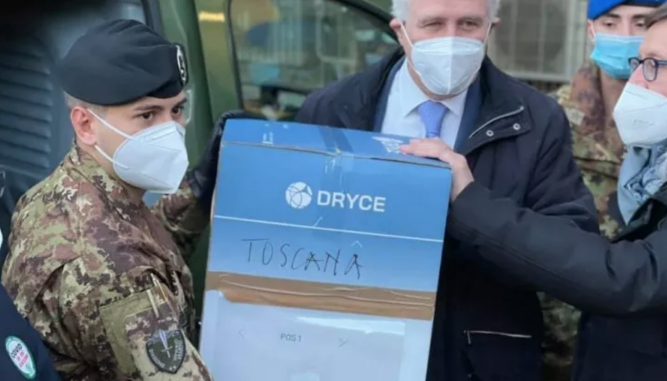COVID-19 Vaccine Arrives in Florence

The first shipment of the Pfizer BioNTech vaccine against Coronavirus arrived at Florence’s Careggi Hospital pharmacy under army escort at 8 o’clock in the morning of December 27, 2020. The doses–620 in all–will be used to vaccinate doctors and nurses in 11 Tuscan hospitals and a few patients in a nursing home, Montedomini in downtown Florence. In addition to Careggi, the other hospitals that will be distributing the vaccine are the Nuovo San Giovanni di Dio (Torregalli) in Florence; San Jacopo (Pistoia); Santo Stefano (Prato); San Giuseppe (Empoli); AUO University Hospital (Pisa); the Livorno Hospital; San Luca (Lucca); Apuane Hospital (Massa); Scotte University Hospital (Siena); San Donato (Arezzo); and the Misericordia Hospital (Grosseto).
The first medical worker received the vaccine at Careggi at 8:45 am, followed by Montedomini at 11 am and the other hospitals starting at 11 am.
Unexpected detection of SarsCoV2 antibodies in the pre-pandemic period
On a related note, a blood sample study of 959 subjects who had participated in lung cancer screening revealed the presence of specific antibodies to the SarsCoV2 virus five months before the discovery of the first patient infected with COVID-19, casting new light on the onset and spread of the coronavirus pandemic.
Research by the Cancer Institute in Milan and the University of Siena published in the medical publication Tumori Journal indicated the SarsCoV2 virus was circulating in Italy as early as September 2019, long before the first official reports from Chinese authorities in December 2019. According the study, 111, or 11.6% of subjects tested already had antibodies, which suggests the virus began to spread asymptomatically several months before the first Italian COVID-19 patient was discovered in the town of Codogno in February. In addition, a proportion of people are shown to develop antibodies to SarsCoV2 after being infected with a common cold pathogen of the coronavirus family.
But some medical experts view this study with caution. Massimo Galli, Director of Infectious Diseases in Milan’s Luigi Sacco Hospital, seems somewhat doubtful that the virus has been around for so long, “because then we can’t explain why it did not create outbreaks much earlier.”
For some heartening news on the potential long-term immunity to the virus, researchers at the La Jolla Institute of Immunology and the University of Arizona report that immunity to COVID-19 might last for years or even decades. As reported by the New York Times, a study which took blood samples from 185 recovered patients suggests a potent and long-lasting immune response. This reflects a similar study on patients who contracted SARS, also a coronavirus, which indicated survivors still carried immune cells 17 years after recovering.
The results, not yet peer reviewed or published in a scientific journal, still provide hope for previously infected persons’ long-term immunity and the potential efficacy for longstanding vaccine results when available to the world population.
To read more in Italian, visit Florence’s La Repubblica news site. (rita kungel)
